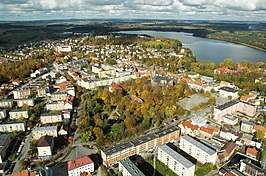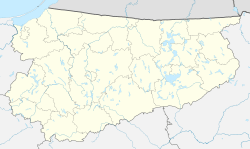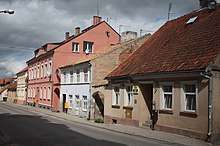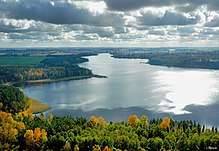Olecko
Olecko [ɔˈlɛt͡skɔ] (former German: ![]()
![]()
![]()
Olecko | |
|---|---|
    
| |
 Flag  Coat of arms | |
 Olecko  Olecko | |
| Coordinates: 54°2′N 22°30′E | |
| Country | |
| Voivodeship | |
| County | Olecko County |
| Gmina | Gmina Olecko |
| Established | 16th century |
| Town rights | 1560 |
| Government | |
| • Mayor | Karol Sobczak |
| Area | |
| • Total | 11.6 km2 (4.5 sq mi) |
| Population (2011) | |
| • Total | 22,384 |
| • Density | 1,900/km2 (5,000/sq mi) |
| Time zone | UTC+1 (CET) |
| • Summer (DST) | UTC+2 (CEST) |
| Postal code | 19-400 to 19-402 |
| Area code(s) | +48 87 |
| Car plates | NOE, NOG |
| Website | http://www.olecko.pl |
History

Marggrabowa was founded as a town by Albert, Duke of Prussia, a vassal of Poland, on January 1, 1560. The town's Polish-sounding name is derived from the word Margrabia (Polish for Margrave), the duke's title as the margraviate of Brandenburg-Ansbach's prince, by adding the suffix "-owa", which is typical in Poland for place names derived from personal names and titles. The town's coat of arms still reflects the Brandenburg red eagle and the Hohenzollern black and white which go back to Duke Albert. The populace became Lutheran-Protestant within the Duchy of Prussia, a vassal state of Poland, in 1525. The almost entirely Polish population of the town used the Polish name Olecko.[1]
At the same location as the present location of the town there has been a hunting lodge called Olecko since 1544. At a peninsula towards the lake, across the Lega river, in 1619 the Castle of Olecko (Schloss Oletzko) was established as a regional administrative seat for the Dukes of Prussia.
The town remained under Polish suzerainty until 1657. In 1701 it became part of the Kingdom of Prussia and, subsequently, in 1871, it became part of Germany. Between 1818 and 1945, Marggrabowa was the seat of Oletzko County (Kreis Oletzko) in the province of East Prussia, created in 1773.
20th century
After Poland regained its independence (1918), in 1920 a plebiscite was to be held in the area by the League of Nations according to the Treaty of Versailles, to determine the future of the region and the town. The plebiscite resulted in 3,903 votes for Germany and none for Poland.[2] As a result, the town was renamed Treuburg (lit.: loyal town) in 1928.
After World War II the town again became part of Poland, under territorial changes demanded by the Soviet Union at the Potsdam Conference.
Sights

In the northern part of the town's market square, a Catholic church is situated on a tree-covered hill.
Transport
The Train Station in the western part of town is a regional railway junction: there were main lines to Gołdap, Ełk and Suwałki. The local railway connections to Mieruniszki, Kruklanki and Sulejki are out of service or dismantled. Currently only bus service runs from the train station.
Notable residents
- Gustav Bergenroth (1813-1869), German historian
- Kurt Blumenfeld (1884–1963), Zionist
- Arthur Zimmermann (1864–1940), diplomat, author of the Zimmermann Telegram
- Bartosz Romańczuk (born 1983), Polish footballer
International relations
References
- Słownik geograficzny Królestwa Polskiego i innych krajów słowiańskich, Tom VI, Warsaw, 1885, p. 114, 116 (in Polish)
- Marzian, Herbert; Kenez, Csaba (1970). Selbstbestimmung für Ostdeutschland – Eine Dokumentation zum 50 Jahrestag der ost- und westpreussischen Volksabstimmung am 11. Juli 1920 (in German). p. 65.
External links
- Municipal website of Olecko (en)(pl)
- Website of Olecko (pl)
- iOlecko - news, events, history, photos from Olecko (pl)
| Wikimedia Commons has media related to Olecko. |